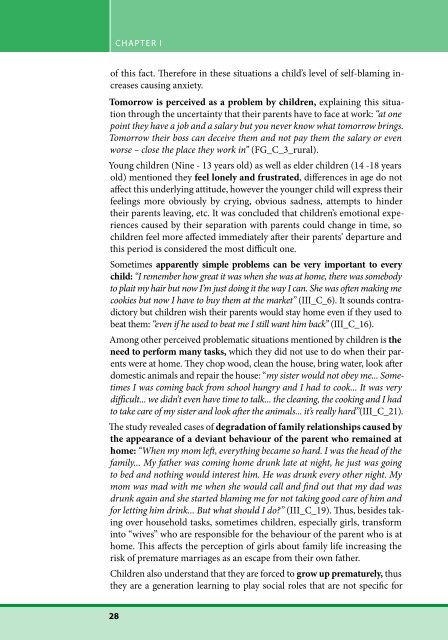specific needs of children and elderly left behind as a ... - IOM Moldova
specific needs of children and elderly left behind as a ... - IOM Moldova
specific needs of children and elderly left behind as a ... - IOM Moldova
Create successful ePaper yourself
Turn your PDF publications into a flip-book with our unique Google optimized e-Paper software.
CHAPTER I<br />
<strong>of</strong> this fact. Therefore in these situations a child’s level <strong>of</strong> self-blaming incre<strong>as</strong>es<br />
causing anxiety.<br />
Tomorrow is perceived <strong>as</strong> a problem by <strong>children</strong>, explaining this situation<br />
through the uncertainty that their parents have to face at work: “at one<br />
point they have a job <strong>and</strong> a salary but you never know what tomorrow brings.<br />
Tomorrow their boss can deceive them <strong>and</strong> not pay them the salary or even<br />
worse – close the place they work in” (FG_C_3_rural).<br />
Young <strong>children</strong> (Nine - 13 years old) <strong>as</strong> well <strong>as</strong> elder <strong>children</strong> (14 -18 years<br />
old) mentioned they feel lonely <strong>and</strong> frustrated, differences in age do not<br />
affect this underlying attitude, however the younger child will express their<br />
feelings more obviously by crying, obvious sadness, attempts to hinder<br />
their parents leaving, etc. It w<strong>as</strong> concluded that <strong>children</strong>’s emotional experiences<br />
caused by their separation with parents could change in time, so<br />
<strong>children</strong> feel more affected immediately after their parents’ departure <strong>and</strong><br />
this period is considered the most difficult one.<br />
Sometimes apparently simple problems can be very important to every<br />
child: “I remember how great it w<strong>as</strong> when she w<strong>as</strong> at home, there w<strong>as</strong> somebody<br />
to plait my hair but now I’m just doing it the way I can. She w<strong>as</strong> <strong>of</strong>ten making me<br />
cookies but now I have to buy them at the market” (III_C_6). It sounds contradictory<br />
but <strong>children</strong> wish their parents would stay home even if they used to<br />
beat them: “even if he used to beat me I still want him back” (III_C_16).<br />
Among other perceived problematic situations mentioned by <strong>children</strong> is the<br />
need to perform many t<strong>as</strong>ks, which they did not use to do when their parents<br />
were at home. They chop wood, clean the house, bring water, look after<br />
domestic animals <strong>and</strong> repair the house: “my sister would not obey me... Sometimes<br />
I w<strong>as</strong> coming back from school hungry <strong>and</strong> I had to cook... It w<strong>as</strong> very<br />
difficult... we didn’t even have time to talk... the cleaning, the cooking <strong>and</strong> I had<br />
to take care <strong>of</strong> my sister <strong>and</strong> look after the animals... it’s really hard”(III_C_21).<br />
The study revealed c<strong>as</strong>es <strong>of</strong> degradation <strong>of</strong> family relationships caused by<br />
the appearance <strong>of</strong> a deviant behaviour <strong>of</strong> the parent who remained at<br />
home: “When my mom <strong>left</strong>, everything became so hard. I w<strong>as</strong> the head <strong>of</strong> the<br />
family... My father w<strong>as</strong> coming home drunk late at night, he just w<strong>as</strong> going<br />
to bed <strong>and</strong> nothing would interest him. He w<strong>as</strong> drunk every other night. My<br />
mom w<strong>as</strong> mad with me when she would call <strong>and</strong> find out that my dad w<strong>as</strong><br />
drunk again <strong>and</strong> she started blaming me for not taking good care <strong>of</strong> him <strong>and</strong><br />
for letting him drink... But what should I do?” (III_C_19). Thus, besides taking<br />
over household t<strong>as</strong>ks, sometimes <strong>children</strong>, especially girls, transform<br />
into “wives” who are responsible for the behaviour <strong>of</strong> the parent who is at<br />
home. This affects the perception <strong>of</strong> girls about family life incre<strong>as</strong>ing the<br />
risk <strong>of</strong> premature marriages <strong>as</strong> an escape from their own father.<br />
Children also underst<strong>and</strong> that they are forced to grow up prematurely, thus<br />
they are a generation learning to play social roles that are not <strong>specific</strong> for<br />
28

















